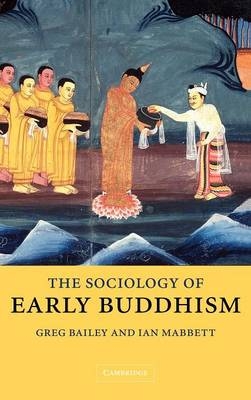
The Sociology of Early Buddhism
Cambridge University Press (Verlag)
978-0-521-83116-1 (ISBN)
Early Buddhism flourished because it was able to take up the challenge represented by buoyant economic conditions and the need for cultural uniformity in the newly emergent states in north-eastern India from the fifth century BCE onwards. This book begins with the apparent inconsistency of Buddhism, a renunciant movement, surviving within a strong urban environment, and draws out the implications of this. In spite of the Buddhist ascetic imperative, the Buddha and other celebrated monks moved easily through various levels of society and fitted into the urban landscape they inhabited. The Sociology of Early Buddhism tells how and why the early monks were able to exploit the social and political conditions of mid-first millennium north-eastern India in such a way as to ensure the growth of Buddhism into a major world religion. Its readership lies both within Buddhist studies and more widely among historians, sociologists and anthropologists of religion.
Greg Bailey has been teaching Sanskrit, Indian religions and Indian Literature at La Trobe University for the past twenty-four years. He has a PhD in Indian Studies from Melbourne University (1980). In the semester 1998 he was a visiting research fellow in the Seminar for Indian Studies and Comparative Religion at the University of Tübingen. He is a member of the International Consultative Committee of the International Association of Sanskrit Studies and a member of the Board of the Dubrovnik International Conference on the Sanskrit Epics and Puranas. Ian Mabbett was Professor of Indian and Buddhist Studies, Aichi Bunkyo University, Nagoya, 2000–2, and has made frequent research trips to India and South-East Asia (including visiting forest monasteries in Thailand). He is author of A Short History of India (1983); co-author (with David Chandler) of The Khmers (1995); and contributor to Jon Ortner (photographer), Angkor: Celestial Temples of the Khmer Empire (2002) and to reference books such as The Cambridge History of Southeast Asia (1992) and Encyclopedia of Asian History (1988).
Acknowledgements; List of abbreviations; Introduction; 1. The problem: asceticism and urban life; Part I. Context: 2. The social elite; 3. Economic conditions; 4. Urbanization, urbanism and the development of large-scale political structures; 5. Brahmins and other competitors; 6. Folk religion and cosmology: meeting of two thought worlds; Part II. Mediation: 7. The holy man; 8. Preparation of the monk for the mediatory role. Evidence from the Sutta Nipata; 9. The Dhammapada and the images of the bhikkhu; 10. The mediating role as shown in the Canon; 11. Exchange; Conclusion; Bibliography; Index.
| Erscheint lt. Verlag | 27.11.2003 |
|---|---|
| Verlagsort | Cambridge |
| Sprache | englisch |
| Maße | 162 x 236 mm |
| Gewicht | 625 g |
| Themenwelt | Geisteswissenschaften ► Archäologie |
| Geschichte ► Teilgebiete der Geschichte ► Religionsgeschichte | |
| Geisteswissenschaften ► Religion / Theologie ► Buddhismus | |
| Sozialwissenschaften ► Ethnologie | |
| Sozialwissenschaften ► Soziologie | |
| ISBN-10 | 0-521-83116-4 / 0521831164 |
| ISBN-13 | 978-0-521-83116-1 / 9780521831161 |
| Zustand | Neuware |
| Haben Sie eine Frage zum Produkt? |
aus dem Bereich


